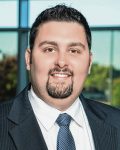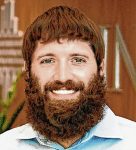The two at-large seats on the seven-member Seymour Common Council are up for grabs in the Nov. 7 general election.
Republican Drew Storey is the only incumbent, as Bret Cunningham chose not to seek reelection.
The other candidates are newcomers: Republican Clint Blish, Democrat Tonya Pacey and independents Steve Deweese and Tyler Henkle.
Registered voters can cast their ballots early from 9:30 a.m. to 5:30 p.m. weekdays this week and from 9:30 a.m. to 4:30 p.m. Saturday at the Jackson County Public Library, 303 W. Second St., Seymour, and Jackson County Courthouse, 111 S. Main St., Brownstown. Voting centers will be open from 6 a.m. to 6 p.m. on Election Day.
The Tribune sent questions to the at-large candidates. That includes a couple of reader-submitted questions. Four of the five candidates answered them. Blish declined to participate in the Q&A.
Storey
Pacey
Deweese
Henkle
Why did you decide to run for the Seymour Common Council?
Storey: I decided to run for the Seymour Common Council because I deeply care about our community. I also feel a strong sense of urgency to preserve, protect and promote the conservative principles we have come to appreciate about Seymour for our current and future residents. Having served on the council already, I’ve seen the positive impact we can have, and I want to continue working toward a better Seymour.
Pacey: I was born and raised in Seymour and always wanted to see it take off and be busy downtown. When I moved back home and started a business and actually live downtown, as well, I wanted to actually be a part of what helps shape the community.
Deweese: I’ve been interested in the idea of running for office for many years. Now that my daughters are teenagers and I have stepped back a bit from my other interests, I finally have the time that the city of Seymour deserves from an elected official. I think that the council needs a member that is unafraid to challenge the status quo, someone who answers to no specific political ideology or who bends to the will of local industry, someone who understands that they are employed to represent the best interests of Seymour and its citizens, not just the ones with whom they agree or from whom they can profit.
Henkle: The people of Seymour, those I call family, friends, neighbors and fellow citizens. Everything worth doing is worth doing because of the people it will impact. This is why I engage in public service regardless of my “title” or elected representative status. I do believe I can positively impact the lives of the people of Seymour by being elected to represent and serve them on the Seymour Common Council.
What do you think you can bring to the council?
Storey: I believe I can bring experience, competency, dedication and a commitment to listen to our residents. I have a proven track record of collaboration, partnership and problem-solving, and I’m passionate about improving infrastructure, enhancing services and promoting economic growth.
Pacey: My plan is to bring a new set of ears and eyes to the city council. I recall only one woman being on Seymour City Council. I believe as a small business owner and woman entrepreneur that has traveled to study different parts of the country, I can bring fresh, new ideas.
Deweese: I believe that I bring true public representation and no personal agenda. As a member of the council, I would be the middle ground and the voice of compromise that will help find solutions to problems that are mired in political red tape. As a father of one adult and two teen daughters as well as a teacher at the Seymour Intermediate School, I have developed near superhuman patience and the ability to resolve conflicts in a way that is fair and equitable to all sides. When you are in a room with 40 10-year-olds for eight hours a day, you learn very quickly how to overcome adversity and keep your eyes on a common goal.
Henkle: Diversity of thought. I have been frequently attending and engaging with different levels of government, including the city council, for almost a decade, and I am often discouraged by the lack of discussion and perspective beyond the typical left and right ways of doing things. Diversity of thought can bring innovation and new ideas. That is what I can and do bring.
What’s the most pressing issue facing the city at this time, and how do you plan to address it?
Storey: The most pressing issue facing the city at this time is the need for improved infrastructure, especially our aging roads and an underground network of pipes. I plan to address this by advocating for smart strategic investments and seeking funding to ensure reliable, resilient, safer and more efficient infrastructure in Seymour.
Pacey: I believe right now, Seymour’s biggest issue is community and togetherness. I plan on being a voice from the other side of the table to help foster community-oriented solutions.
Deweese: Housing, housing and more housing. We need to start holding property owners accountable for the lack of upkeep on their properties and insist that they either make them livable or risk sanctions. If we have the ability to shudder a motel that has 100 people living in it, then certainly there is something we can do to motivate the owners of the empty downtown shops, gymnasiums and green spaces who would rather see them become a safety hazard than a benefit to our community.
Henkle: Substance misuse and mental health concerns. These two pressing issues permeate just about every other concern we have. Workforce is impacted by poor workforce mental health and addiction issues. An overwhelming amount of crime is directly linked to these matters. Physical illness can be created by and exacerbated by these issues. I professionally work on these priorities in 12 counties in Indiana. I am passionate about them, and I have lived experience in them. Changing how we talk about and work toward improving them is what I do. I will work to continue to bring them to the forefront of city discussions and utilize all the resources we have, can find and create to bring about positive changes in these areas with a focus on preventing them to begin with in our youth populations.
What do you think will be the biggest challenge facing Seymour in five years, and what would be your best idea to mitigate that challenge now?
Storey: In the next five years, Seymour is likely to face several challenges that demand our attention. These include addressing the need for a more diverse range of housing options to accommodate our growing population, stimulating economic development and promoting ESL growth and inclusion. Additionally, we must address the potential shift away from the core conservative values that have long been integral to our community’s prosperity. To address these multifaceted challenges, I will continue to focus on challenging our leaders to think far beyond the status quo, leveraging strategic planning, collaboration and community engagement. This approach ensures that Seymour remains a welcoming and thriving city for all while preserving the traditional values that have made our community strong.
Pacey: Space to grow. I believe Seymour is always growing but lacking things to do. We have so many people that leave town on the weekends when we should make Seymour a place people want to stay and put their money back into the community. I believe finding more things for children and young adults to do would help that. I also believe creating parking solutions and more green space downtown now will make way for the future.
Deweese: I think that the biggest challenge is the same as the most pressing issue. How do we continue to shoehorn more and more people into a city that can’t seem to find a space for affordable housing to be built but that can build a new park every few years? I love green spaces and I think they are essential to any city’s appeal, but maybe we pump the brakes a bit until there aren’t any unhoused people in tents out by the interstate. As a musician, I would much rather have seen a high-rise apartment complex or a parking garage for the downtown residents than a government-sanctioned music venue that gets interrupted by a train every few hours. We are beautifying a city full of people for whom we can not supply affordable housing. The beautification will come in time, but we need to have everyone in a clean, well-maintained residence or we will see the problems with drug abuse, blight and overpopulation continue to soar.
Henkle: In addition to substance misuse and mental health challenges, the past few years have really begun to show that we are on the precipice of extreme housing insecurity. During my time working with the Cold Night Out Emergency Shelter, I came to realize the scope of homelessness in Seymour, but since then, it has become clearer that housing insecurity is growing and becoming a reality for even more people. To mitigate this, we can do and should do better when it comes to policy and decisions pertaining to housing. Allowing variances in residential neighborhoods for short-term rental properties while not allowing long-term housing to be built in other residential neighborhoods is counterintuitive and only further constricts the supply of affordable housing options on the market. This is something that happened just this year, and it is decisions like these that are shortsighted and not in the best interest of the people who choose to call Seymour their permanent home. I will fight for policies and decisions that will lead to more affordable and sustainable housing solutions because the people of Seymour deserve to be able to afford a roof over their heads.
What are you most proud of about Seymour?
Storey: What I’m most proud of about Seymour is our strong sense of community. We’re a tight-knit, supportive town where people genuinely care about each other. I want to preserve and strengthen this sense of community while driving progress for our city’s future.
Pacey: I am proud of how much it is evolving. The saying has always been “Big enough to want it, small enough to kill it.” I don’t think that’s true anymore. We want it, and we are going to support it and come together. In doing so, more people will want to also come to our welcoming city.
Deweese: It’s home. I was born here, and I have no plans to ever leave. Over a year ago, I was diagnosed with a rare form of cancer, and within a few weeks of my diagnosis, I had people dropping off food, coming over to pray with me and organizing full-blown benefit concerts to help me get through what was an emotionally devastating season of my life. It’s who we are. It’s who we’ve always been. We help our own. I owe everything that I am to this town and to its people. I am now healthy and humbled, and I can’t wait to give back to a city that has given so much to me by making sure that we are all heading in the right direction together.
Henkle: People are taking action, whether it be substance misuse and mental health or the diaper pantry resource, the Curb Appeal Program or the way in which older generations are reaching out about the issues they are seeing with the city and wanting to be involved in the solutions. We are a group of people who are becoming more empowered for the shared and mutual benefit of one another. This action and empowerment to create something better and to not live in the past but to continue working and striving for a better future, this is what I am most proud of when I tell people throughout the state and beyond that I live in Seymour.




